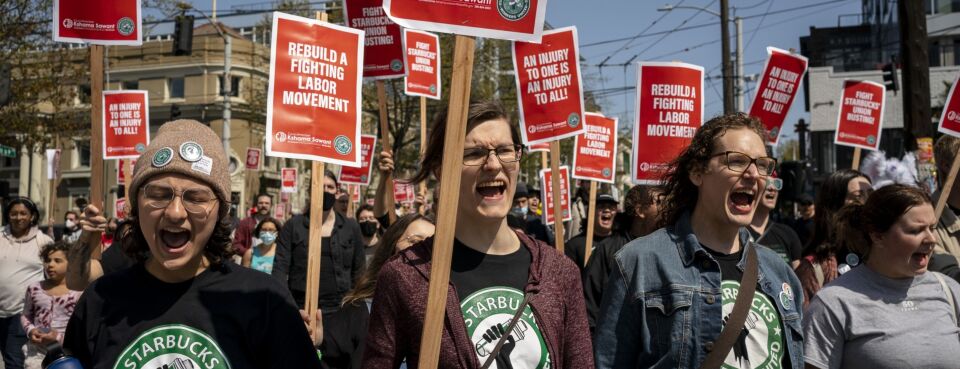
Julio Colby is a student at Harvard Law School.
In Today’s News & Commentary: The Sixth Circuit upholds an injunction compelling the rehiring of the “Memphis 7;” and a revived case about the use of preferred pronouns may offer the first test of the Supreme Court’s new standard for religious workplace accommodations.
On Tuesday, the Sixth Circuit upheld a federal judge’s injunction compelling Starbucks to rehire five of seven pro-union workers fired at a Memphis, Tennessee store, agreeing that the firings had a high likelihood of chilling organizing activity. The February 2022 firing of the so-called “Memphis 7” — 5 members of the store’s six-person organizing committee and two outspoken union supporters — was an early chapter in Starbucks’ “dirty war” against unions. Last summer, a district court judge found that the store’s organizing drive was at risk of irreparable harm without the rehiring of the workers. In affirming the judge’s finding, the panel noted the “actual evidence of the chill” resulting from the company’s anti-union campaign: testimony in the record showed that workers at the Memphis store stopped wearing union pins and discussing union matters after the firing; workers at a Jackson, Tennessee store were hesitant to organize after Starbucks posted a notice at their store detailing the discharges in Memphis; and a manager at a Florida store suggested to workers that unionization “would lead to a response from Starbucks similar to the one in Memphis.” As such, the panel reasoned, a temporary injunction was necessary “to preserve the status quo pending completion of the board’s proceedings.” The workers were rehired last fall, after the store ultimately voted to unionize by an 11-3 vote in June 2022. Starbucks maintains that the evidence was insufficient to support injunctive relief and said the company is “exploring all options for further legal review.”
A recently revived case in Indiana over the use of preferred pronouns may offer the first test of the Supreme Court’s new standard for religious accommodations in the workplace. John Kluge, a schoolteacher in Indiana, sued Brownsburg Community School Corporation for discrimination after it rescinded a religious accommodation allowing him to refer to students exclusively by their last names. Kluge brought suit under Title VII, which requires an employer to accommodate religious practices unless doing so would pose an “undue hardship.” He lost his case under previous Supreme Court precedent in Trans World Airlines v. Hardison, which had been interpreted as defining “undue hardship” to mean more than a “de minimis” cost. But in a unanimous opinion in June of this year, the Supreme Court “clarified” in Groff v. DeJoy that the de minimis test was incorrect; the Court instead stated that the correct reading of the “undue burden” test under Hardison is whether the accommodation places a “substantial burden” on the employer, based on a “fact-bound” inquiry. A Seventh Circuit panel had affirmed the district court’s ruling in favor of Brownsburg but vacated its decision last month in light of the Supreme Court’s ruling. The case now heads back to the district court to apply the new “substantial burden” test under Groff, but attorneys say the Court’s opinion did not give clear guidance to lower courts on when an accommodation constitutes a “substantial burden,” leading some to believe the question may find itself before the Supreme Court again. (Check out Andrew’s discussion of how the Court’s opinion in Groff leaves the door open for a lower court to allow religiously observant workers to override union contracts.)






Daily News & Commentary
Start your day with our roundup of the latest labor developments. See all
July 4
The DOL scraps a Biden-era proposed rule to end subminimum wages for disabled workers; millions will lose access to Medicaid and SNAP due to new proof of work requirements; and states step up in the noncompete policy space.
July 3
California compromises with unions on housing; 11th Circuit rules against transgender teacher; Harvard removes hundreds from grad student union.
July 2
Block, Nanda, and Nayak argue that the NLRA is under attack, harming democracy; the EEOC files a motion to dismiss a lawsuit brought by former EEOC Commissioner Jocelyn Samuels; and SEIU Local 1000 strikes an agreement with the State of California to delay the state's return-to-office executive order for state workers.
July 1
In today’s news and commentary, the Department of Labor proposes to roll back minimum wage and overtime protections for home care workers, a federal judge dismissed a lawsuit by public defenders over a union’s Gaza statements, and Philadelphia’s largest municipal union is on strike for first time in nearly 40 years. On Monday, the U.S. […]
June 30
Antidiscrimination scholars question McDonnell Douglas, George Washington University Hospital bargained in bad faith, and NY regulators defend LPA dispensary law.
June 29
In today’s news and commentary, Trump v. CASA restricts nationwide injunctions, a preliminary injunction continues to stop DOL from shutting down Job Corps, and the minimum wage is set to rise in multiple cities and states. On Friday, the Supreme Court held in Trump v. CASA that universal injunctions “likely exceed the equitable authority that […]